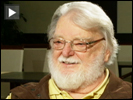Vegas Drone Trial Makes History
Fourteen anti-war activists may have made history today in a Las
Vegas courtroom when they turned a misdemeanor trespassing trial into a
possible referendum on America’s newfound taste for remote-controlled
warfare.
The
so-called Creech 14, a group of peace activists from across the
country, went on trial this morning for allegedly trespassing onto
Creech Air Force Base in April 2009.
From the start of today’s trial, prosecutors did their best to keep
the focus on whether the activists were guilty of allegations they
illegally entered the base and refused to leave as a way to protest the
base’s role as the little-known headquarters for U.S. military
operations involving unmanned aerial vehicles, or drones, over
Afghanistan, Iraq and Pakistan.
But a funny thing happened on the way to prosecutors’ hope for a quick decision.
Appearing as witnesses for the Creech 14 today were some of the
biggest names in the modern anti-war movement: Ramsey Clark, former
U.S. attorney general under President Lyndon Johnson; Ann Wright, a
retired U.S. Army colonel and one of three former U.S. State Department
officials who resigned on the eve of the 2003 invasion of Iraq; and
Bill Quigley, legal director for the New York City-based Center for
Constitutional Rights.
By the time those three witnesses finished their testimony as to why
they believed the activists had protested at the base, they’d managed
to convince Las Vegas Township Justice Court Judge William Jansen to
delay his verdict for four months — and had managed clearly to
frustrate prosecutors.
For the better part of the day, Clark, Wright and Quigley testified
under direct questioning from witnesses and a surly cross-examination
from the Clark County district attorney’s office.
Each witness spoke eloquently, and at length, about the need for
nonviolent civil disobedience in the face of criminal actions by the
U.S. government — which is how most in today’s anti-war movement and
many international observers have characterized America’s drone war.
“[People] are allowed to trespass if it’s for the greater good — and
there are certainly exceptions [to the law] when there is an emerging,
urgent need,” said Quigley, while on the stand.
By all accounts, the Creech 14 trial is the first time in history an
American judge has allowed a trial to touch on possible motivations of
anti-drone protesters.
No one knows how Jansen will ultimately rule, but most took it as a
good sign when, at the end of the day’s proceedings, applause flooded
the courtroom and Jansen sent the Creech 14 — all of them part of a
robust Catholic anti-war movement — on their way by echoing the words
of Jesus Christ with his call of “Go in peace!”


 From
a Brazilian fisherman to a Chinese shopkeeper, from a German performer
to an Afghan farmer, all answered the same questions about their fears,
dreams, ordeals, hopes: "Who are you? What have you learned from your
parents? What does love mean to you?" A project of "Earth From Above"
photographer Yann Arthus Bertrand, 6 Billion Others weaves together
video portraits of lives across the globe. Each face is strikingly
different. Each answer is remarkably human. Emerging from Bertrand's
quest "to learn to live together," these vignettes capture the stunning
diversity of mankind while unleashing the universal nature of humanity.
[
From
a Brazilian fisherman to a Chinese shopkeeper, from a German performer
to an Afghan farmer, all answered the same questions about their fears,
dreams, ordeals, hopes: "Who are you? What have you learned from your
parents? What does love mean to you?" A project of "Earth From Above"
photographer Yann Arthus Bertrand, 6 Billion Others weaves together
video portraits of lives across the globe. Each face is strikingly
different. Each answer is remarkably human. Emerging from Bertrand's
quest "to learn to live together," these vignettes capture the stunning
diversity of mankind while unleashing the universal nature of humanity.
[![dronetrial.png []](http://www.commondreams.org/files/article_images/dronetrial.png)